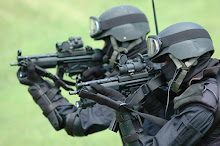
National Guard troops here are poised to take up surveillance positions along the U.S. border with Mexico as part of Operation Copper Cactus. A year-long federal mission calls for up to 1,200 National Guard Soldiers and Airmen to support U.S. Customs and Border Protection and U.S. Immigration and Customs Enforcement in Arizona, California, New Mexico and Texas.
The majority of the troops will support the CBP with entry identification teams and support ICE with criminal investigative analysts for one year. "Arizona is uniquely situated as a border state to support Customs and Border Protection directly," said 1st Lt. Valentine Castillo, Arizona National Guard public affairs officer.
Training for the entry identification teams includes how to handle encounters with anyone who approaches their observation posts.
The teams monitor the border from strategic observation points with state-of-the-art surveillance and detection tactics and technology in support of local law enforcement.
"They act as extra eyes and ears for the Border Patrol," Castillo said.
Surveillance sites in Nogales are on high ground from which Soldiers can monitor miles of border, sending observations to the Border Patrol and freeing up agents for other duties.
The criminal investigative analysts will assist ICE agents in reducing the flow of illegal bulk currency and weapons from the United States to Mexico.
Because of the severe climate on the border, where temperatures frequently exceed 100 degrees, the Arizona Soldiers are also receiving combat lifesaver training, Castillo said.
For many of the Soldiers, the course is a refresher of training they have already received. Many of them have deployed for previous domestic missions and operations abroad, and have experience in a combat environment.
"Morale is high," Castillo said. "They're ready to finish [training] and support Customs and Border Protection and Immigration and Customs Enforcement."
Around the state, Soldiers are also training in radio operations, environmental awareness and specialized surveillance equipment. Soldiers are also qualifying on their weapons, an annual requirement for all Soldiers.
The National Guard has been providing Southwest border support for a number of years through counter-drug programs, and they're prepared for a larger mission, said Maj. Gen. Peter Aylward, who is coordinating the four-state operation at the National Guard Bureau.
The National Guard successfully supported the border security mission during Operation Jump Start from 2006 to 2008.
"The National Guard historically has always performed well," Aylward said. "This is a very important mission for this nation that's an intensification of earlier efforts that began in 1993. This is just another chapter of a great initiative."
With nearly 470,000 Soldiers and Airmen, the National Guard is uniquely suited to support homeland defense operations and border security missions.
(www.military.com)
The majority of the troops will support the CBP with entry identification teams and support ICE with criminal investigative analysts for one year. "Arizona is uniquely situated as a border state to support Customs and Border Protection directly," said 1st Lt. Valentine Castillo, Arizona National Guard public affairs officer.
Training for the entry identification teams includes how to handle encounters with anyone who approaches their observation posts.
The teams monitor the border from strategic observation points with state-of-the-art surveillance and detection tactics and technology in support of local law enforcement.
"They act as extra eyes and ears for the Border Patrol," Castillo said.
Surveillance sites in Nogales are on high ground from which Soldiers can monitor miles of border, sending observations to the Border Patrol and freeing up agents for other duties.
The criminal investigative analysts will assist ICE agents in reducing the flow of illegal bulk currency and weapons from the United States to Mexico.
Because of the severe climate on the border, where temperatures frequently exceed 100 degrees, the Arizona Soldiers are also receiving combat lifesaver training, Castillo said.
For many of the Soldiers, the course is a refresher of training they have already received. Many of them have deployed for previous domestic missions and operations abroad, and have experience in a combat environment.
"Morale is high," Castillo said. "They're ready to finish [training] and support Customs and Border Protection and Immigration and Customs Enforcement."
Around the state, Soldiers are also training in radio operations, environmental awareness and specialized surveillance equipment. Soldiers are also qualifying on their weapons, an annual requirement for all Soldiers.
The National Guard has been providing Southwest border support for a number of years through counter-drug programs, and they're prepared for a larger mission, said Maj. Gen. Peter Aylward, who is coordinating the four-state operation at the National Guard Bureau.
The National Guard successfully supported the border security mission during Operation Jump Start from 2006 to 2008.
"The National Guard historically has always performed well," Aylward said. "This is a very important mission for this nation that's an intensification of earlier efforts that began in 1993. This is just another chapter of a great initiative."
With nearly 470,000 Soldiers and Airmen, the National Guard is uniquely suited to support homeland defense operations and border security missions.
(www.military.com)

No comments:
Post a Comment